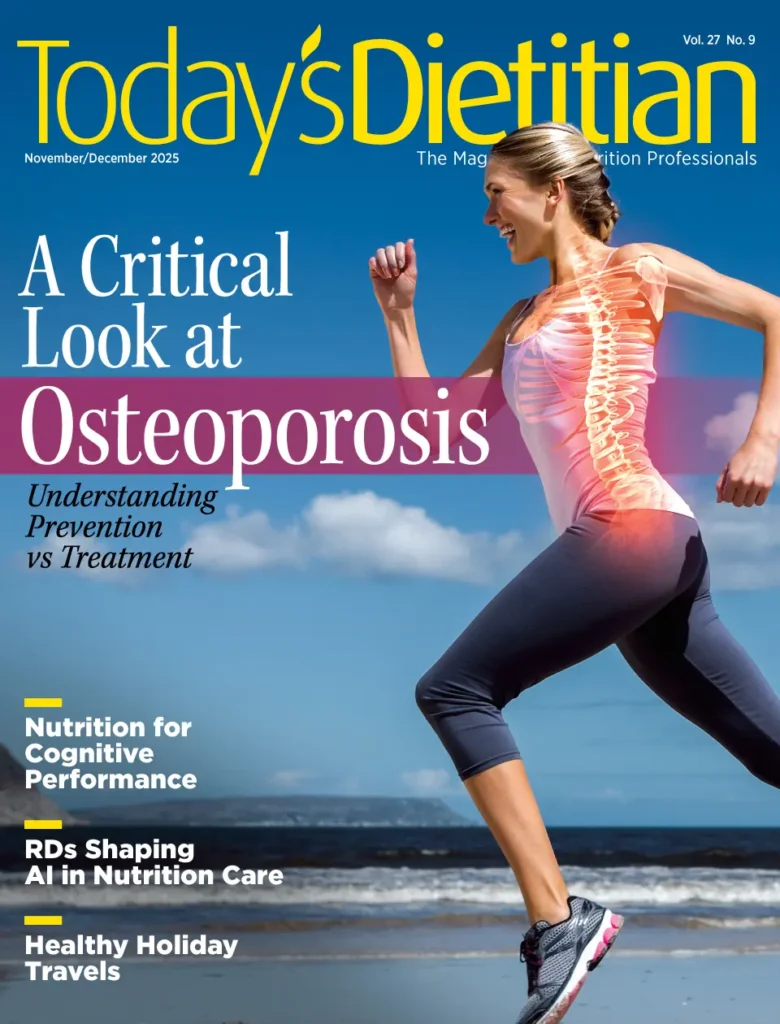By Densie Webb, PhD, RD
Dairy foods represent about 10% of the calories in a typical American diet, mostly from milk and cheese, plus small amounts from yogurt.1 Most experts recommend consumption of dairy products as part of an overall healthful diet to reduce the risk of osteoporosis, colorectal cancer, and hypertension. Dairy foods, specifically low-fat dairy, are an integral part of the proven DASH (Dietary Approaches to Stop Hypertension) diet. Dairy products contribute several important nutrients, including calcium; vitamins A, D, and B12; riboflavin; niacin; phosphorus; potassium; and high-quality protein. Fermented dairy products, such as yogurt and kefir, contribute probiotics, believed to exert beneficial effects in the gut, stimulating the growth of “good” bacteria.
However, it has been suggested that consuming full-fat dairy products increases the risk of chronic disease, including CVD. Research from decades past suggests that the saturated fat in full-fat dairy products, such as cheese, milk, and yogurt, is to blame. As a result, dietary guidelines, including the most recent 2015–2020 Dietary Guidelines for Americans, have recommended consuming low-fat or fat-free dairy products. However, studies also suggest that the cholesterol-raising effects of saturated fatty acids (SFAs) are lessened or nullified when they’re components of complex foods such as milk, cheese, or yogurt. The combination of dairy bioactive peptides, minerals, and other types of fat creates a complex matrix that may limit the cholesterol-raising effect of SFAs. Moreover, several recent reviews, meta-analyses, and population studies have concluded the opposite of earlier studies (ie, consumption of dairy products, even full-fat dairy products, reduces CVD risk). Here are some of the relevant studies published in the last five years and their findings suggesting that full-fat dairy products may be beneficial for the heart.
• A 2014 review of 18 observational studies that examined the association between dairy consumption and risk of CVD in Current Nutrition Reports pointed to a potentially protective effect of full-fat milk, cheese, and yogurt on the risk of CVD.2
• A review of epidemiologic and experimental studies published in 2014 in the The American Journal of Clinical Nutrition found that consumption of yogurt and other dairy products, including cheese, didn’t exert negative effects on blood lipids as predicted solely by the content of saturated fat.3
• A 2015 meta-analysis of 22 prospective cohort studies published in Asia Pacific Journal of Clinical Nutrition examined total dairy consumption and risk of CVD and found a beneficial effect of dairy consumption on CVD.4
• A comprehensive review of randomized controlled trials published in 2016 in Advances in Nutrition found no apparent harmful effects of dairy consumption, regardless of the fat content, on several cardiometabolic variables, including lipid levels, blood pressure, inflammation, insulin resistance, and vascular function.5
• Two studies published in 2017 in the American Journal of Epidemiology found similar results. A large cohort study of more than 42,000 men and women found that a high yogurt or cheese intake was associated with a 16% lower CVD risk. Higher intake of high-fat dairy foods wasn’t associated with CVD mortality.6 A second study, a meta-analysis of 29 prospective cohort studies, found no association between dairy intake (high- and low-fat dairy, or high-fat alone) and deaths from CVD. The analysis also found that intake of cheese was associated with a 2% lower risk of CVD for every 10 g consumed per day.7
• A three-week randomized crossover study with 17 healthy adults, published in 2018 in the European Journal of Clinical Nutrition, compared the effect of whole milk consumption with skim milk consumption on fasting blood lipids in healthy adults. The researchers found that drinking about two cups of whole milk per day had no negative effect on fasting blood lipids, glucose, or insulin compared with skim milk.8
All together, these studies strongly suggest that full-fat dairy doesn’t have a detrimental effect on CVD risk. However, the age and health of the subjects, the length of the studies, and the amounts and types of full-fat dairy consumed varied among the studies. Still, the studies raise serious questions as to the validity of the current recommendations to avoid full-fat dairy products.
— Densie Webb, PhD, RD, is a freelance writer, editor, and industry consultant based in Austin, Texas.
References
1. Yu E, Hu FB. Dairy products, dairy fatty acids, and the prevention of cardiometabolic disease: a review of recent evidence. Curr Atheroscler Rep. 2018;20(5):24.
2. Rice BH. Dairy and cardiovascular disease: a review of recent observational research. Curr Nutr Rep. 2014;3:130-138.
3. Astrup A. Yogurt and dairy product consumption to prevent cardiometabolic diseases: epidemiologic and experimental studies. Am J Clin Nutr. 2014;99(5 Suppl):1235S-1242S.
4. Qin LQ, Xu JY, Han SF, Zhang ZL, Zhao YY, Szeto IM. Dairy consumption and risk of cardiovascular disease: an updated meta-analysis of prospective cohort studies. Asia Pac J Clin Nutr. 2015;24(1):90-100.
5. Drouin-Chartier JP, Côté JA, Labonté MÈ, et al. Comprehensive review of the impact of dairy foods and dairy fat on cardiometabolic risk. Adv Nutr. 2016;7(6):1041-1051.
6. Farvid MS, Malekshah AF, Pourshams A, et al. Dairy food intake and all-cause, cardiovascular disease, and cancer mortality: The Golestan Cohort Study. Am J Epidemiol. 2017;185(8):697-711.
7. Guo J, Astrup A, Lovegrove JA, Gijsbers L, Givens DI, Soedamah-Muthu SS. Milk and dairy consumption and risk of cardiovascular diseases and all-cause mortality: dose-response meta-analysis of prospective cohort studies. Eur J Epidemiol. 2017;32(4):269-287.
8. Engel S, Elhauge M, Tholstrup T. Effect of whole milk compared with skimmed milk on fasting blood lipids in healthy adults: a 3-week randomized crossover study. Eur J Clin Nutr. 2018;72(2):249-254.


